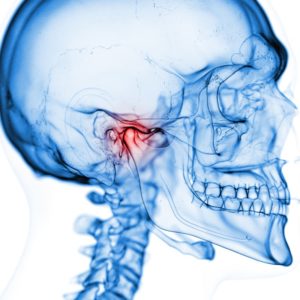 You’re not alone if you wake up every morning with a stiff, swollen jaw. Over 10 million Americans suffer from a temporomandibular joint (TMJ) disorder, which can lead to serious chronic jaw pain. However, you might think you’ll be able to ignore it or hope it goes away on its own. No need to see a professional over a few aches, right? Don’t be so sure; while TMJ in Las Vegas isn’t life-threatening, letting it go untreated could seriously diminish your quality of life. Here’s why you should pay attention to the health of your jaw.
You’re not alone if you wake up every morning with a stiff, swollen jaw. Over 10 million Americans suffer from a temporomandibular joint (TMJ) disorder, which can lead to serious chronic jaw pain. However, you might think you’ll be able to ignore it or hope it goes away on its own. No need to see a professional over a few aches, right? Don’t be so sure; while TMJ in Las Vegas isn’t life-threatening, letting it go untreated could seriously diminish your quality of life. Here’s why you should pay attention to the health of your jaw.
What Causes a TMJ Disorder?
First, it’s important to recognize how a TMJ disorder (TMD) occurs. Your TMJ is the joint in front of the ear that connects the lower jaw to the skull. A TMD is generally the result of stress on this joint and other tissues.. Risk factors include:
- An improper bite (overbite, underbite, crossbite)
- Poor jaw alignment
- Bruxism (involuntary teeth grinding or clenching)
- Certain forms of arthritis
- Jaw injuries
These conditions won’t guarantee the development of TMD, but they will make it much more likely.
What if a TMD Goes Unaddressed?
A TMJ disorder can cause numerous symptoms, such as facial, jaw or neck pain, muscle stiffness, and jaw clicking. These issues can become more and more disruptive the longer they go untreated; they might even affect your ability to eat and speak normally.
You might also suffer from intense, possibly debilitating headaches on a frequent basis, or your teeth might become worn down from grinding. There’s even evidence that the near-constant discomfort of a TMD can contribute to depression by affecting sleep and overall mood.
If you notice the symptoms of a TMD, it’s best to seek treatment as soon as possible so that it doesn’t develop into something more serious.
How Can TMD Be Treated?
In most cases, TMD needs treatment from a professional. You can often get an oral appliance that brings the jaw into proper alignment, taking stress off the joint and lessening the symptoms; moreover, the appliance also protects against teeth grinding in Las Vegas, which might be a direct cause of the disorder.
On occasion, surgery might be required. For example, an arthroplasty might be performed in more complex cases in order to directly address issues with the joint. Sometimes the joint might be so badly damaged that a prosthetic replacement is required.
If you suspect that you might have a TMD, it’s important to find a specialist who can effectively identify and address the problem. Be sure to describe your symptoms in detail for an accurate diagnosis. Once a disorder is found, you can start seeking relief; there’s no reason to live with constant jaw pain if you don’t have to!
About the Author
Dr. Pamela West has extensive training and experience regarding TMJ disorders; she can offer oral appliance therapy to help relieve discomfort in your jaw. Her Las Vegas practice, iSleepSolutions, can also help patients with a potentially severe sleep disorder called sleep apnea. To request a free consultation, visit her website or call (702) 602-2000.
